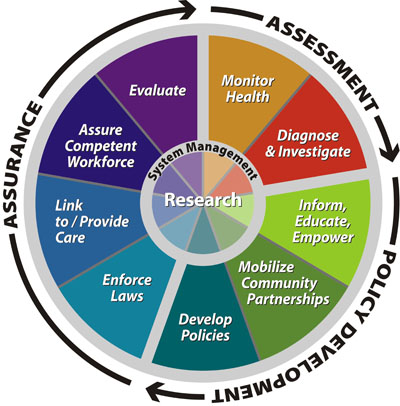Career outlook
What can I do with a degree in public health?
Training in public health prepares undergraduate students for a wide range of careers. We work to solve hunger, chronic and infectious diseases, improve mental health and end violence. Public health professionals work in government agencies, hospitals, health systems, non-profit organizations and as business leaders, lawyers, policymakers and entrepreneurs. Students learn to ask probing questions, collect and analyze data and propose novel solutions to some of society’s biggest challenges.
Our students are well-prepared with skill-based courses that lead to professional concentrations. Through education, advocacy, research, policy and practice, our graduates promote the health and well-being of communities locally, nationally and globally. If you’re looking to improve health, eliminate disease, solve problems and lift communities, an undergraduate degree in public health is a great choice.
Transferable skills
A public health degree offers skills in:
- Critical thinking
- Budgeting and fundraising
- Communication (verbal and written)
- Problem-solving
- Teamwork and leadership
- Research methods and statistics
- Project coordination and management
- Program planning, implementation and evaluation
Career insights
A degree in public health can lead to a variety of career paths. Here are just a few of the many opportunities available in this field.
| Career | Median salary |
|---|---|
| Biostatistician | $104,110 |
| Clinical data manager | $108,020 |
| Epidemiologist | $77,000 |
| Environmental scientists and specialists | $79,980 |
| Health education specialist | $62,860 |
| Health informatics specialist | $103,000 |
| Medical and health services manager | $110,680 |
| Preventive medicine physician | $236,000 |
| Social and community service manager | $77,030 |
This data provides a broad overview of how major selection can lead to careers and is provided without any implied promise of employment. Some careers will require further education, skills or competencies. Actual salaries may vary significantly between similar employers and could change by graduation, as could employment opportunities and job titles.
Graduate study
This degree also provides a solid foundation for graduate study in:
- Master of Public Health (M.P.H.)
- Master of Social Work (M.S.W.)
- Healthcare administration
- Master of Business Administration (M.B.A.)
- Master of Public Health (M.P.H.)
- Medical school
- Nursing
- Nutrition
- Ph.D. program in sociology, anthropology, etc.
- Physician assistant
- Public policy
- Social work
Notable people with a public health major
- Susan Desmond-Hellmann (chief executive officer of the Bill & Melinda Gates Foundation)
- Christy Turlington (model)
- Dorothy Louise Slaughter (United States representative for New York's 25th congressional district)
- Brian Kamoie (deputy assistant secretary and director, Office of Policy and Strategic Planning in the United States Department of Health and Human Services)
Major functions of public health

According to the U.S. Department of Health and Human Services' Public Health Functions Project and the Center for Disease Control and Prevention, public health services should include the following:
- Research: for new insights and innovative solutions to health problems
- Evidence-based approaches: using an evidence-based approach helps to define areas where research is lacking (and that evidence comes from research)
- Assessment: identifying health problems and priorities
The ten most common functions of public health services include:
- Monitoring health status to identify community health problems.
- Diagnosing and investigating health problems and health hazards in the community.
- Informing, educating and empowering people about health issues.
- Mobilizing community partnerships to identify and solve health problems.
- Developing policies and plans that support individual and community health efforts.
- Enforcing laws and regulations that protect health and ensure safety.
- Linking people to needed personal health services and assure the provision of health care when otherwise unavailable.
- Assuring a competent public health and personal health care workforce.
- Evaluating effectiveness, accessibility and quality of personal and population-based health services.
- Evaluating the effectiveness of public health interventions.
It is likely that students who major in public health and go on to careers in this field will be engaged in some of the above activities.
Source: Public Health Functions Project, U.S. Dept. of Health and Human Services